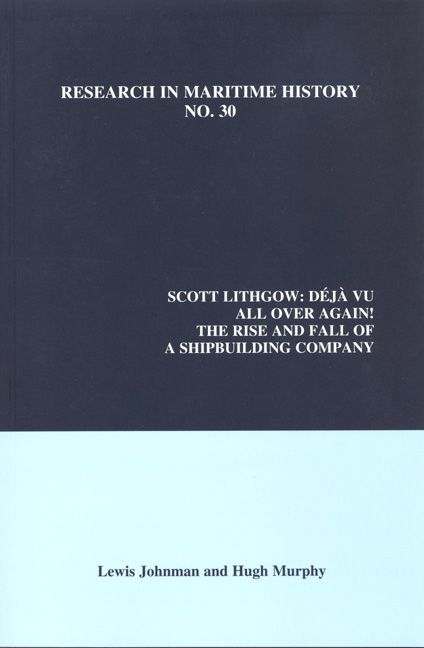Book contents
- Frontmatter
- Contents
- Acknowledgement
- Introduction
- Chapter 1 Scotts of Greenock, 1711-1945
- Chapter 2 Russell and Company to Lithgows Limited, 1874-1945
- Chapter 3 Scotts Shipbuilding and Engineering, 1945-1965
- Chapter 4 Lithgows Limited, 1945-1965
- Chapter 5 The Long March to Merger, 1965-1970
- Chapter 6 The Road to Nationalisation, 1970-1977
- Chapter 7 Nationalisation to Privatisation, 1977-1984
- Chapter 8 Déjà vu All over Again: Trafalgar House, 1984-1988
- Chapter 9 Conclusion
- Appendix
- Bibliography
Chapter 3 - Scotts Shipbuilding and Engineering, 1945-1965
- Frontmatter
- Contents
- Acknowledgement
- Introduction
- Chapter 1 Scotts of Greenock, 1711-1945
- Chapter 2 Russell and Company to Lithgows Limited, 1874-1945
- Chapter 3 Scotts Shipbuilding and Engineering, 1945-1965
- Chapter 4 Lithgows Limited, 1945-1965
- Chapter 5 The Long March to Merger, 1965-1970
- Chapter 6 The Road to Nationalisation, 1970-1977
- Chapter 7 Nationalisation to Privatisation, 1977-1984
- Chapter 8 Déjà vu All over Again: Trafalgar House, 1984-1988
- Chapter 9 Conclusion
- Appendix
- Bibliography
Summary
The prospect of a diminution in warship work after Scotts had cleared its war backlog presented the firm with a number of problems. First, as a result of its concentration on this type of work, Scotts would have to re-orientate its productive resources to take advantage of an upturn in demand in the mercantile sector. Second, since beyond the replacement of war losses it was by no means certain how long the demand for merchant vessels would last, the firm had to preserve its capability to take advantage of any future upturn in naval work. Indeed, these factors were equally applicable to all other mixed mercantile and naval builders. In the wake of die interwar experience, it was not clear that any future attempt at a contra-cyclical ordering strategy by the Admiralty could or would be undertaken to even out the demand cycle. Indeed, as the Cold War intensified, the old certainties that had informed Admiralty policy shifted in response to rapid technological and strategic change in a nuclear era.
The state of the two markets rarely coincided, and there was no guarantee that any future downturn in mercantile activity would be compensated for by a corresponding upturn in naval construction. Conditioned to a large extent by the boom/slump mentality of the interwar years, shipbuilders were aware of these constraints. What changed perceptions and the pattern of activity in shipbuilding in the immediate postwar period – in stark contrast to most of the interwar years – was the largely unforeseen longevity of the growth in mercantile demand. After the restoration of the merchant marine, in what was in effect a protected market, and with most of the industry's major competitors in disarray, British shipbuilders benefited from a period of sustained growth in world trade. The so-called “long boom” was marked by a hitherto unprecedented sellers’ market for merchant tonnage that the British shipbuilding and marine engine building industries did not exploit fully. Even the prospect of full order books and strong employment did not lead to an expansion of capacity. Neither did it lead the Admiralty, in light of reduced postwar circumstances, to attempt to rationalise the bloated warship-building sector, a decision that would have better been made sooner than later.
In the immediate aftermath of war, Scotts concentrated on clearing its backlog of naval work.
- Type
- Chapter
- Information
- Scott LithgowDéjà Vu all over again! The Rise and Fall of a Shipbuilding Company, pp. 81 - 116Publisher: Liverpool University PressPrint publication year: 2005



